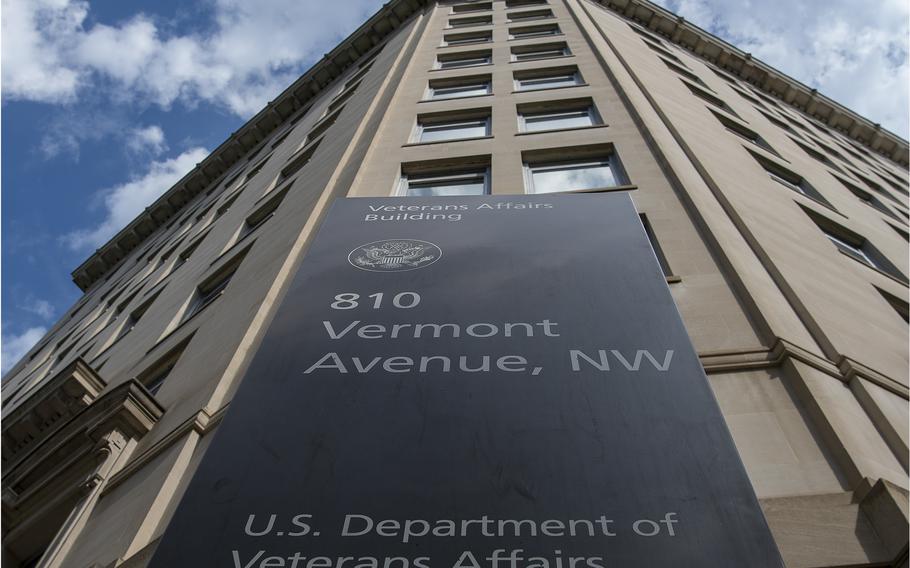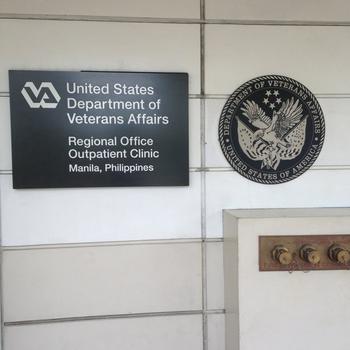
The Department of Veterans Affairs headquarters building as seen in Washington, D.C., on July 6, 2022. (Carlos Bongioanni/Stars and Stripes)
WASHINGTON — Vietnam veteran Jim Esposito, who retired to the Philippines from Oklahoma in 2010, receives spinal treatments and pain medication at the Department of Veterans Affairs clinic in Manila for injuries suffered during military service 50 years ago.
Terrence Michalski, a disabled Navy veteran also residing in the Philippines, has had frequent hospitalizations for a heart condition and degenerative disk disease related to combat duty.
Both veterans said they must pay thousands of dollars each year for their medical care because the VA’s paper-based claims system leads to delays and uncertainties for health care reimbursement.
The VA has pledged to phase in an electronic payment system for its foreign medical program, but the process is not scheduled to get underway for two years.
“These payments are currently issued by paper check and mailed around the world to either veterans or providers. Starting in late [fiscal] 2025 and continuing to 2027, VA will release electronic funds transfer capabilities in phases. [Electronic funds transfer] reduces wait time for reimbursement and is more secure,” said Terrence Hayes, the VA press secretary.
The VA said 80% of claims come from Panama, the Dominican Republic, Costa Rica, the Philippines and Germany.
But veterans advocacy groups are calling on the VA to bring more urgency to adopt electronic payments and end the practice of using paper claims and the postal service to issue health care reimbursements. The delays create significant hardship for aging, sick and disabled veterans living overseas because doctors and hospitals often require payment up front and will not render care without it, according to the groups.
The Veterans of Foreign Wars described the VA’s Foreign Medical Program as outdated, unreliable and leading to unnecessary delays for veterans living outside the United States.
“We are working to address inequities” with Congress and the VA, the VFW said in a statement. “We urge VA to revise its antiquated paper-based system and utilize electronic funds transfer to allow veterans and service providers to file claims and receive reimbursement from VA through electronic means.”
About 55,000 veterans are enrolled in the overseas medical assistance program but there are now about 6,000 active users in the program, according to the VA.
Veterans have said if the system functioned better there would be more users.
The VA pays monthly disability benefits to veterans with service-connected disabilities based on the seriousness of their disability. The disability claims process starts when a veteran submits a claim to the VA.
Veterans living abroad are entitled to the same disability benefits as those living in the U.S., the Government Accountability Office stated in a 2020 report that examined the Foreign Medical Program for veterans.
The GAO report found the number of disability claims for veterans living abroad increased nearly 15% from fiscal 2014 to fiscal 2019. The report also found the time it took to process claims varied based on the country of origin. VA officials acknowledged it typically takes longer to process foreign claims than domestic ones.
“Hospitals and doctors that once accepted the Foreign Medical Program as insurance for payment of services and medication have experienced a waiting time of longer than a year for compensation. One by one, the hospitals and doctors are canceling acceptance of the Foreign Medical Program,” said Michalski, a retired chief petty officer who served for 22 years with deployments to Vietnam, the Philippines and Kuwait.

Vietnam veteran Jim Esposito receives his care at the Manila VA clinic in the Philippines. He said it is common for doctors to ask for payment up front before rendering services. Esposito said he pays about $2,000 for care monthly and then files for reimbursement by mail with the Department of Veterans Affairs. The process can take up to a year, he said. (Department of Veterans Affairs)
Esposito, who uses a wheelchair, estimates he and his wife spend about $2,000 a month for his spinal injections and other treatment at the VA clinic in Manila to ease inflammation and chronic pain.
“It takes several months to get any reimbursement,” said Esposito, a retired sergeant whose two years of active duty ended in 1969 and included deployments to Cambodia and the demilitarized zone in Vietnam.
“I am sick, old, worn out and pain filled. There are so many unnecessary protocols and bureaucratic runarounds to get the care and coverage I need,” he said.
Esposito traveled to a VA hospital in Colorado eight years ago after being referred for spinal surgery. He said he was turned down for the surgery after an in-person exam and ended up paying for a private surgeon in the Philippines.
“We pay for Jim’s medical care. All our retirement income goes for his care,” said Therrie Esposito, his wife and full-time caretaker. She said it is difficult to cover household expenses without timely reimbursements.
“Don’t get me wrong. We appreciate the coverage we receive for Jim’s medical care. But we never know when we will be paid back,” she said.
Veterans advocates said medical care payment overseas is often demanded up front and “pay as you go.”
“I am 100% permanently and totally disabled as a result in my service for my country. Here in the Philippines costs for doctors visits are manageable. However, hospitals require advance payment prior to admission and extensive care,” Michalski said.
Veterans and their caretakers who pay out of pocket fill out forms with the VA Civilian Health and Medical Program and then use the postal service to submit the claims, along with copies of paid medical bills and other documentation from their doctors.
The Medical City Clark in the Philippines where Michalski receives medical care stopped accepting the VA program in May because of excessive waits for payment, he said.
“The hospital at TMC Clark had in place personnel that processed any required forms and waived any out-of-pocket costs for us. Recently TMC Clark suspended this program,” Michalski said.
Under VA regulations, the agency is not authorized to reimburse veterans for travel expenses for certain services incurred in foreign countries as it does for those in the United States. Consequently, some veterans living in foreign countries might be unable to afford to travel to exams, according to veterans advocacy groups.
Esposito estimated the VA has covered only about 25% of the $28,000 that they’ve paid for spinal surgeries in Manila and the United States, which includes their costs for travel.
“Travel costs from our residence to Manila are not provided. Our travel costs to the U.S. for treatment also was not covered,” he said.
Esposito said the VA in Manila advised him to move back to the U.S. if he wants his medical care and travel costs fully covered by the VA.
“My wife is from the Philippines. This is our home now,” he said.